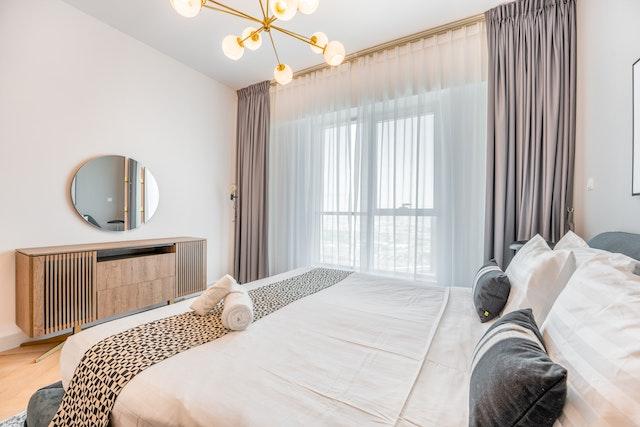Should I Allow Tenants to Paint my Rental Property?

Key Takeaways
- Tenant Satisfaction Matters – Letting tenants paint can make them feel more at home, but it’s important to have clear guidelines in place.
- Set Clear Rules – Require approval and limit color choices to keep the property looking great.
- Offer a Fair Compromise – You can allow painting as long as tenants repaint before moving out.
- Prevent Future Issues – A well-defined lease agreement ensures everyone is on the same page.
As a landlord, you reserve the right to either allow or not allow tenants to paint your rental property.
If you allow tenants to paint your rental property, you stand to benefit in certain ways. Including high occupancy rates and making your property stand out from the competition.
On the other hand, certain cons come with allowing tenants this privilege. Your maintenance costs can go up, and there is a possibility of the tenant doing a shoddy job.
Clearly, both options have their pros and cons. But the good news is, with a good policy, you may be able to overcome most, if not all, of the challenges of allowing tenants to paint their rented premises.
At IPM Property Management, we help landlords set clear guidelines to protect their investment while keeping tenants happy. Keep reading to learn more!
Pros of Allowing Tenants to Paint Your Rental Property
The following are some of the benefits you stand to reap by allowing your tenants to paint their rental property.
Stand Out from the Competition
You see, most landlords don’t allow their tenants to make any property alterations, including painting their favorite color palette. As such, by allowing your tenants to do so, you may be able to stand out from the competition.

And being competitive in the local rental space can enable you to enjoy high occupancy rates.
Solidify the Landlord-Tenant Relationship
By honoring a tenant’s request to paint their rental, you’ll be showing them that you prioritize their comfort.
This strengthens the landlord-tenant relationship, and in turn, the tenant may reciprocate the kind gesture by caring for the property and renting longer.
Charge More Rent
As already mentioned, allowing tenants to paint their rented premises can make your property stand out. And with the increased rental demand, you could raise rental rates accordingly.
Make sure you do due diligence first so as not to overcharge or undercharge tenants.
Attract High-Quality Tenants
Allowing tenants to personalize their rented premises can be a big plus in your marketing efforts. This can make you attract a large prospective tenant pool, increasing your chances of landing a high-quality and long-term tenant.
And high-quality tenants are every landlord’s dream. They are the caliber of tenants who will care for their rented premises, pay rent on time, and sign multiple leases.
Cons of Allowing Tenants to Paint Your Rental Property
Admittedly, allowing tenants the privilege to paint their favorite colors isn’t without some disadvantages. The following are some of the challenges to keep in mind when conducting your due diligence on whether or not to allow it.

Unprofessional Workmanship
This is something that you may have to ponder before allowing a tenant to paint their rental a new color. The tenant may either choose to go DIY or hire a cheap painting service, which may result in poor workmanship.
High Operational Costs
If you’re like most landlords, you require that tenants return their rented premises in the move-in condition, less normal wear and tear.
That said, a difficult tenant may choose to leave without repainting the unit the original color palette. In such a case, it’d be your responsibility to do the fixes, which can eat into your time and even finances.
Property Damage
In the process of repainting their rental, tenants can cause damage to other parts of the property.
Accidental spills or splashes, for example, can cause damage to the trim, floors, and other fixtures, making it more challenging to maintain the property.
Improper wall preparation can also lead to damage.
Should You Allow Tenants to Paint Their Rented Premises?
Carefully consider the pros and cons aforementioned before making the decision. If the challenges outweigh the benefits in your case, then don’t allow tenants to do so.
You could even let them know that it’d be a gross lease violation to make any property alterations to the unit.

But if you do decide to allow tenants to paint their rentals, then make sure to let them know of your expectations. Don’t let the tenant run with their imaginations in this regard so to speak.
Ideally, have a clause on the lease agreement that specifically addresses all your concerns. The following are some of the things you may want the tenant to fulfill when painting their rented premises.
Only Paint Certain Areas
Don’t allow tenants to paint any areas they like; this is often a bad idea on the landlord’s part. Be specific on the areas they can paint. For example, in bedrooms, but not in bathrooms or kitchens.
Require Professional Services
While anyone can paint, not everyone can do it professionally. A messy paint job can come back to haunt you in terms of high restoration costs and extended vacancy periods.
That’s why you should require tenants to only work with professionals. These are the kinds of people that will guarantee you professional workmanship for peace of mind.
Require Restoration before Move Out
Most leases, as previously mentioned, require tenants to return their rented premises in the same move-out condition, less normal wear and tear.
This can help ensure that the property is ready to rent to the next tenant, ensuring minimal turnover costs.
Require Payment of a Fee
Charge tenants an extra fee for the privilege of allowing them to paint their rented units. This amount can help you pay for any liabilities that can arise as a result of allowing the tenant to paint their unit. Liabilities can include an unprofessional paint job, choice of the wrong color palette, or damage to other areas during the painting process.
Bottom Line
Whether to allow tenants to paint or not to paint their rented premises is often a question on most landlords’ minds.
Before making a decision, carefully weigh both the pros and cons. Also, consider whether the mitigation factors are going to be worthwhile.
For expert help in this regard or any other aspect of property management, look no further than IPM Property Management. Our comprehensive suite of services is designed to meet your unique needs. Get in touch today to get started!
